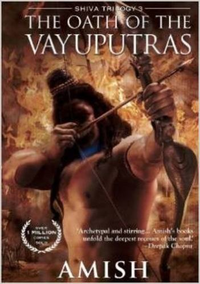#TheOathOfTheVayuputras
The Oath of the Vayuputras
The Oath of the Vayuputras is a 2013 novel by Indian author Amish Tripathi and the final book in his Shiva trilogy. The book was released on 27 February 2013, through Westland Press and completes the mythical story about an imaginary land Meluha and
Read More..
Ratings
Likes
Reviews
None
9 years ago
I write this review keeping in mind that with a great start to any work, comes the heavy responsibility of providing a fitting closure and in most cases, well begun is only half done. Amish Tripathi’s Shiva trilogy took the Indian reader base by storm and for good reason at that. The book series details the life of Lord Shiva as we know him, but focusing on what happened before he gained reputation as a God. Amish weaves an elaborate plot, beginning with the assumption that Shiva was born a mortal and was only as human as you, me or your irrational neighbor. The first two books talk about how and why Shiva comes to be chosen as the Neelkanth, the savior who would deliver his people from Evil. In the third and final book of the series, ‘The Oath of the Vayuputras’ we find out if Shiva manages to fulfill his destiny. This review focuses only on the third book and contains spoilers without apparent guilt.To begin with, Shiva and his entourage at Panchavati learn how Brahaspati sprang back to life and in the explanation that ensues, Shiva puts two and two together and concludes that the elixir of Meluha, the Somras, is the root cause of everything that went wrong in the past few centuries. This includes a plethora of issues from the creation of Nagas to political unrest in surrounding kingdoms. Hence, Somras = Evil. With the definition finally drafted, everyone makes a choice and picks a side. They are either for or against the Neelkanth as and how their personal faith dictates. The end objective is to take the Somras out of the equation and the ultimate means is through war. The rest of the book is about how the offending and defending powers fight to destroy and protect and I use those terms with all the ambiguity they bring with them. That is the brilliance of the setup. What is good for you may not be so good for me.That said, let me rant on why the book, while strong on so many points, still drew up to be a disappointing conclusion to the series.Bones I’m picking on:1 – Language : All hail the power of editing! Book 3 flows from start to finish, like the waters of the Saraswati, enriched by correct and simple language, free of annoying grammatical errors, spelling mistakes, clichéd dialogues, unnecessary lingo and preachy prose. The text is a relief on your brain and you are free to focus on the plot and not break up now and then to roll your eyes at the author trying to act smart.2 – Narration : This is an extension of the appreciation for point #01. Amish’s voice is honest and that was a striking feature throughout the book. His tone is free of gimmicks and his characters are well defined and sharply etched. They are clear about who they are so you could be clear about your opinion of them.3 – The plot : To be honest, the plot isn’t path breaking. It follows a series of wars that need waging and for most of the time proceeds without shocking turning points or 180 degree flips. That said, it takes a serious turn towards unreasonable when Sati decides to march into Meluha and sign a peace treaty. The ambush, Kanakhala’s choice and Daksha’s foolishness fit in perfectly but then a bunch of Egyptian assassins swoop in and suddenly you find yourself reading about Sati being led to a gory death. This is where the book begins its journey towards being extremely disappointing. I assume Amish decided to finish Sati off in order to give Shiva a reason to use the Pasupatiastra, but the foundation does not sit well, at all. What should’ve been an enraged Shiva gradually losing reason and choosing vengeance, becomes a sorry tale of a widower. In a flash, he is no more the Neelkanth but a husband crying over his dead wife. This, in my opinion defeats the entire point of the series, that projects Shiva as a legend who fought for Good! It seemed like the book ended prematurely when Sati decided foolishly to take on the assassin army, due to guilt and the remaining pages merely came across as a mythological twist to a Nicholas Sparks plot.4 – Contemplations : The dialogue between Shiva and Sati over the existence of Karma and God, and Parvateshwar’s choice were some of the best parts. That also is my favorite thing about this series. Amish allows Shiva to question without fear and agree to disagree. While other mythology titles most often end up as religious propaganda, Amish leaves the answer to faith open. Its all about perspective. Har Har Mahadev, indeed!5 – Parvateshwar, the man : My respect for General Parva went up a thousand notches when he decides to fight for Meluha and not the Neelkanth, who still remains his God. Shiva isn’t able to digest it but I completely agreed with the General. It was such a beautiful digression that goes to waste in the climax. Beyond this decision, Amish gives Parvateshwar no role, except for a few war schemes. In the end, he just lets Parva and Anandamayi die in a quandary. If not for the sloppy ending, Parva could’ve been put to better use and maybe even had a more honorable and useful death.6 – Daksha : This was one of those parts that left me in shock. This man, has just lost his daughter, the one he loved so dearly, the one that apparently had no high opinion of him and tries at every chance to win back her approval. He makes stupid decisions out of love and all that is justifiable. What isn’t is the last few pages he gets, to lament and he does it in reality TV style! There isn’t a chapter in the series that’s as disappointing emotionally as the one where Daksha merely looks out at a banyan tree and awaits his death albeit irritably while his daughter’s mutilated corpse rots outside the city walls. Two thumbs down.7 - The Vayuputras : The book is named after them, but they hardly feature anywhere important, except as a crude sort of arms dealers. What was their oath again that deserved mention in the title?In all, I enjoyed the series immensely, but the final book, the climax in particular, did not measure up. The Neelkanth is reduced to a brokenhearted man, who has lost sight of his mission thereby raising the question of why he received as much build up through three books as having been a living God. I loved Shiva’s portrayal throughout and the climax only cements my opinion that Sati could never have loved him, the way he loved her. Amishji, you broke the man too early!All that said, I’d like to congratulate Amish for staying true to his voice and narration and not trying to pull a commercial success coup. Three cheers. I’d give five stars to the first two books anyday and a four star to the third one, only because I choose to ignore the climax and the crash landing. If the last few lines are any indication, Amish is due to bring out a retelling of the Mahabharatha and if he retains the same kind of transparency with respect to perspective, one that doesn’t get preachy on what is good and what is evil, my kids someday, would finally have an unambiguous account of Indian mythology to read about. Fingers crossed.scribbled by Lazy ThinkTank(https://www.blogger.com/profile/14103024728361258049)
 1 Like
1 Like
 DisLike
DisLike
Popularity
Ranks
This #hashtag is not ranked yet.

